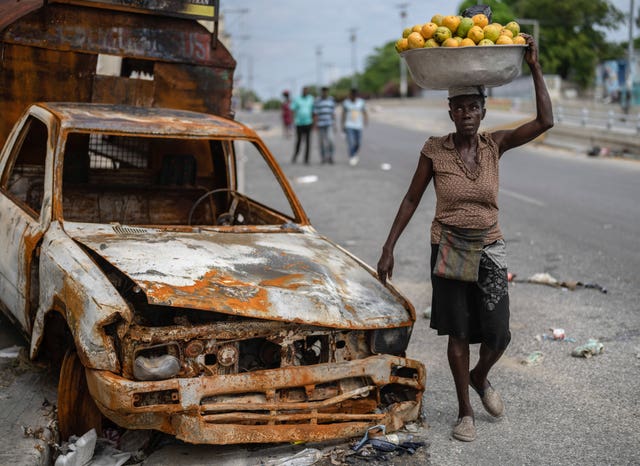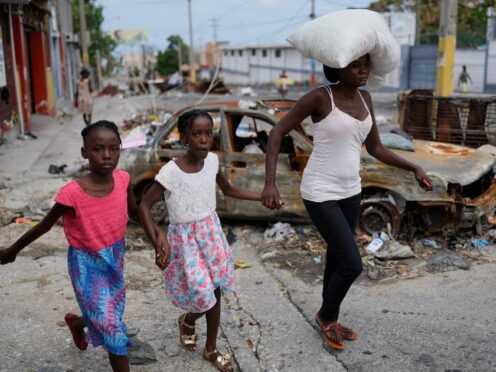Gangs in Haiti laid siege to several neighbourhoods in Port-au-Prince, burning homes and exchanging gunfire with police for hours as hundreds fled the violence early on Thursday in one of the biggest attacks since Haiti’s new prime minister was announced.
The attacks began late on Wednesday in neighbourhoods including Solino and Delmas 18, 20 and 24 located south-west of the main international airport, which has remained closed for nearly two months amid relentless gang violence.
“The gangs started burning everything in sight,” said a man called Nene, who declined to give his last name out of fear. “I was hiding in a corner all night.”
He walked with a friend as they carried a dusty red suitcase between them that was stuffed with clothes – the only thing they could save.

The clothes belonged to Nene’s children, whom he had rushed out of Delmas 18 around dawn during a pause in the fighting.
The neighborhoods that once bustled with traffic and pedestrians were like ghost towns shortly after sunrise, with a heavy silence blanketing the area except for the occasional bleating from a lone goat.
An armoured police truck patrolled the streets, rolling past charred vehicles and cinderblock walls where someone had scrawled “Viv Babecue”, a reference in Haitian Creole to one of Haiti’s most powerful gang leaders.
People whose homes were spared in the attack in Delmas 18 and other nearby communities clutched fans, stoves, mattresses and plastic bags filled with clothes as they fled by foot, motorcycle or on colourful small buses known as tap-taps. Others were walking empty-handed, having lost everything.
“There were gunshots left and right,” said Paul Pierre, 47, who was walking with his partner in search of shelter after their house was burned down. They could not save any of their belongings.
The attack occurred in an area controlled by Jimmy Cherizier, a former elite police officer known as Barbecue who is leader of a powerful gang federation known as G9 Family and Allies.
He and other gang leaders have been blamed for co-ordinated attacks that began on February 29 across the capital, Port-au-Prince.
Gunmen have burned police stations, opened fire on the main international airport and stormed Haiti’s two biggest prisons, releasing more than 4,000 inmates.
The attacks eventually forced prime minister Ariel Henry to resign and led to the creation of a transitional presidential council whose majority unexpectedly announced a new prime minister on Tuesday: Fritz Belizaire, a former sports minister.
The move is threatening to fracture the nine-member council, which was sworn in last week.
As new leaders take charge of the country amid squabbling, Haitians are demanding that they prioritise their safety as gangs remain more powerful and better armed than Haiti’s National Police.
More than 2,500 people have been killed or injured from January to March of this year, a more than 50% increase compared with the same period last year, according to the UN.
Meanwhile, more than 90,000 people have fled Port-au-Prince in just one month as gangs that control an estimated 80% of the capital have increasingly been targeting previously peaceful neighbourhoods.
